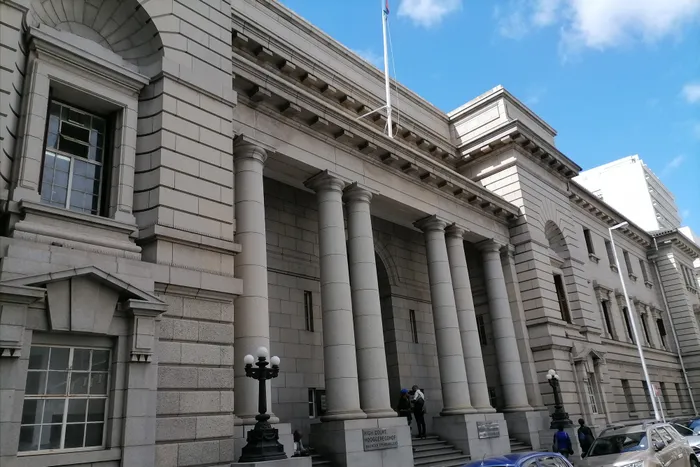VAT hike court case exposes ‘GNU fallacy’

The minister also at the weekend settled out of court with the DA and the EFF on the issue to set the VAT hike aside, with the Western Cape High Court subsequently ratifying the agreement on Sunday.
Image: Patrick Louw
THE judiciary’s involvement in the VAT dispute between coalition partners lays bare a troubling reality; the GNU’s Statement of Intent and its Clearing House Mechanism are proving woefully inadequate as instruments of governance, unable to mediate conflicts effectively or maintain coalition stability.
This is according to political analyst Siseko Maposa, following Finance minister Enoch Godongwana’s agreement to a court order suspending his decision to hike VAT by 0.5%.
The court order comes after the ANC had already announced the suspension of the VAT hike last week following negotiations with parties both inside and outside the GNU.
The minister also, at the weekend, settled out of court with the DA and the EFF on the issue to set the VAT hike aside, with the Western Cape High Court subsequently ratifying the agreement on Sunday.
“Minister Godongwana maintains that his initial budget proposal of March 12, 2025 was constitutional and appropriate given the limited options available to balance fiscal sustainability with service delivery needs. However, recognising that the proposal no longer enjoyed sufficient parliamentary support to pass into law, he made the decision to withdraw it. While proposed reluctantly, the VAT increase was considered less detrimental to economic growth and employment than alternatives examined by the National Treasury. The withdrawal creates a medium-term revenue shortfall of approximately R75 billion, necessitating decreased government expenditure with likely impacts on service delivery,” said Treasury.
While the presiding officers of parliament welcomed the agreement on Monday, they said that it was not an omission of procedural irregularities.
“Parliament affirms that in entering into the settlement, it had not conceded that the parliamentary processes followed in adopting the Fiscal Framework were unlawful or procedurally defective. The decision to reach consensus was motivated by the recognition that new developments had overtaken the original framework. The Minister earlier withdrew the Division of Revenue Bill [B7–2025] and the Appropriation Bill [B6–2025], and introduced the Rates and Monetary Amounts and Amendment of Revenue Laws Bill [B14–2025], which maintains the VAT rate at 15%.
"The settlement, which has been made an order of the Cape High Court, brings resolution to a complex matter of significant national importance,” said Parliamentary spokesperson, Moloto Mothapo. The court outcome enabled Godongwana to table revised budget instruments afresh, he said.
Briefing the media on Monday, EFF leader Julius Malema joined calls for Godongwana to resign. He said National Treasury director-general, Duncan Pieterse should also quit.
“These individuals have proven themselves incapable of formulating a credible and developmental budget. South Africa now faces an urgent task, a credible budget for the 2026 financial year must be tabled by no later than July 2025. The EFF stands ready to table substantial proposals to ensure the new budget focuses on economic recovery, industrialisation, mass employment and the restoration of public service,” Malema said.
DA federal council chairperson Helen Zille said the court’s decision ensures that any changes to the VAT rate must be properly approved by Parliament before taking effect.
“We are pleased that the Minister of Finance eventually came back to the table and agreed to suspend the VAT increase.”
The VAT debacle revealed the fragility of the GNU, according to Maposa, director of Surgetower Associates Management Consultancy.
Most concerning, he said, was the growing spectre of “judicial overreach, which threatens to distort the separation of powers and demands vigilant scrutiny to safeguard both democratic integrity and institutional balance”.
“It has become evident that within the GNU there remains a contentious tug-of-war between the ANC and DA. Added, the judiciary’s intervention in coalition disputes reveals the inadequacy of the GNU Statement of Intent and Clearing House Mechanism as governance tools, failing to mediate conflicts efficiently. This points to a deeper structural tension – whether policy should emerge through collective bargaining or ANC dominance – a rift that risks prolonged policy gridlock that could destabilise the business climate and erode the GNU’s legitimacy,” said Maposa.
Policy analyst Nkosikhulule Nyembezi said the entire debacle could trigger a cabinet reshuffle.
“The GNU’s political dashboard is flashing a yellow caution light after the ANC’s push for an unpopular fiscal framework and tax increase faced the first major political tests of President Cyril Ramaphosa’s second term. And within 48 hours, Ramaphosa could make it go red. The High Court decision reversing Finance Minister Godongwana’s budget was the week’s belching noise that could trigger a cabinet reshuffle,” Nyembezi said.
Economist Mushtak Parker said one way of making up some of the expenditure shortfall, at least in the immediate future, could be through “any additional revenue collected by SARS.”
“The dichotomy is breathtaking. Maybe the finance minister has a point. The DA comes across as an entitled opportunistic coalition participant, savvy in the language of dissent, of policies aligned to its ideological framework instead of the historical circumstances of a country that has only three decades ago emerged from the brutality of apartheid, and of populist pious platitudes.
“Not that the ANC is a beacon of transparency and good governance. A senior ANC official confided that since the days of the state capture, the party has struggled to articulate its policies and position on various issues. This must be considered in the context of all the other caveats – government ineffectiveness, self-enrichment, policy shortcomings and so on. The VAT reversal is another first for the Treasury, which since the dawn of democracy also saw the postponement of the 2025 Budget Speech. For investors, governments, business, and South Africans per se, the reversal and the survival of the GNU may be a sigh of relief. But how long will it be before the GNU becomes “a Coalition of the Unwilling?””
Cape Times